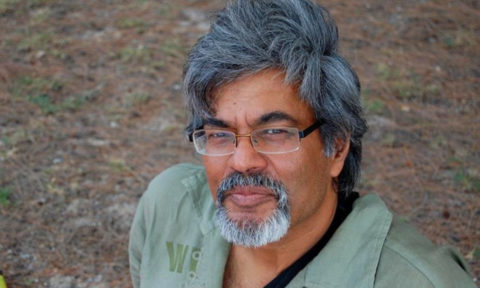[And for the sake]
And for the sake
of uprooting our scapular clays,
the boat of brown stars
was reflected in waves:
since then, in the face of the sky
emptied by sudden typhoons,
bamboozled men resembled droplets of spume.
Without a spurious memory,
the sole true blood, like salt
flowed around
every white seashell
wrenched from the belly of languages.
Speak so as not to forget —
isn’t this the true gift of tongues?
* * * * *
[Since the gray sky]
Since the gray sky will come crashing down
I return with my body, horizon-bound.
With my navel as keel of dawn
I’ll know by heart how to steer my flesh.
Hush up cloud, hush up storm,
the first voice will weep in the sea.
For beings who’ve disappeared, hush up:
the flight of beings augurs BIRTH.
* * * * *
[Ship’s hold is my flesh of spice]
Ship’s hold is my flesh of spice.
Ship’s hold is my flesh of space;
from the point of view of the virgin word
my skin is to blame.
Ship’s hold is my cry of the human race.
Ship’s hold is my memory, full-faced;
a taste of sand on the peephole,
every cry takes my scalp.
* * * * *
[Shadows whisper]
Shadows whisper as clouds parade past:
everything comes to a halt to relate the heart of a trial,
the night of a flesh drum.
And as soon as I see the seashell stairway,
I glimpse the ultimate motive for why we set sail.
* * * * *
Nancy Naomi Carlson on Khal Torabully:
 Khal Torabully is a poet, essayist, film director, and semiologist who has authored some 25 books. Aimé Césaire, the great poet of negritude from Martinique, praised Torabully’s work for “containing all of my humanity.” Born in Mauritius in 1956, Torabully has permeated his work with his migrant heritage. His poetry enacts the transformation of the unimaginable suffering of indentured laborers into a strong and resilient cultural identity and language. Those workers, mostly from India and China, were transported in the same ships that had once shipped slaves to Mauritian sugar cane fields. Torabully has taken the derogatory term “coolie” and has re-visioned, re-imagined, and redefined it to encompass the richness of transcultural exchanges.
Khal Torabully is a poet, essayist, film director, and semiologist who has authored some 25 books. Aimé Césaire, the great poet of negritude from Martinique, praised Torabully’s work for “containing all of my humanity.” Born in Mauritius in 1956, Torabully has permeated his work with his migrant heritage. His poetry enacts the transformation of the unimaginable suffering of indentured laborers into a strong and resilient cultural identity and language. Those workers, mostly from India and China, were transported in the same ships that had once shipped slaves to Mauritian sugar cane fields. Torabully has taken the derogatory term “coolie” and has re-visioned, re-imagined, and redefined it to encompass the richness of transcultural exchanges.
In 2014, UNESCO officially approved the International Indentured Labour Route Project. Torabully has played an active role in this project, offering a new paradigm for the encounter of “memories and imaginaries,” which UNESCO has recognized as “vectors of peace.”
Torabully has stated that “ordinary language” is not enough when giving voice to history’s millions of indentured workers and their horrendous experiences. A major challenge I have faced when translating Torabully is finding the language to honor the music infused in his deeply lyric poems. I map the sounds of the original text (assonance and alliteration), and try to replicate patterns (though not necessarily exact sounds, nor placement in stanzas) in my translation. After the NEA awarded me a literature translation fellowship, they interviewed me and asked about my “sound mapping” technique. Below, the link to that interview in NEA Arts:
https://www.arts.gov/NEARTS/2014v1-opening-world-international-art/invisible-art-translation
The translations published here On The Seawall come from Cale d’étoiles (Cargo Hold of Stars). I have been given the rights to publish these translations.
–NNC